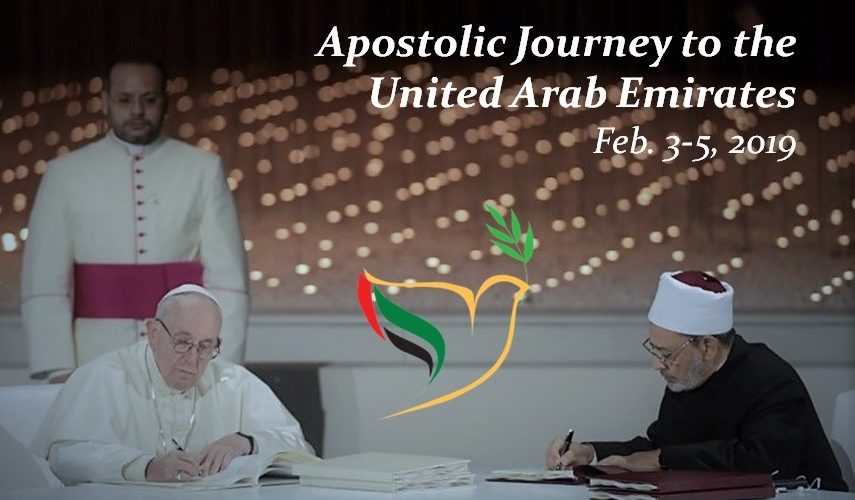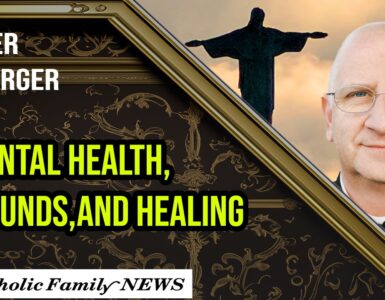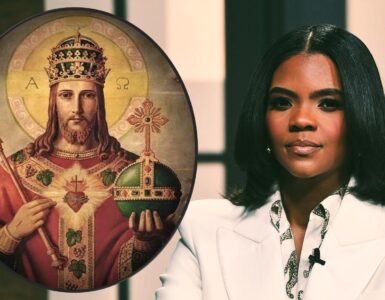Just one week after returning from World Youth Day in Panama, Pope Francis departed Rome again, this time, for a brief trip to the United Arab Emirates (Feb. 3-5), a national federation of seven Islamic states, each ruled by hereditary absolute monarchies. The primary purpose of his visit was to attend an event called the Human Fraternity Meeting — also known as the Global Conference of Human Fraternity — hosted by His Highness Sheikh Mohammed bin Zayed Al Nahyan, Crown Prince of Abu Dhabi (one of the seven “emirates”) and Deputy Supreme Commander of the UAE Armed Forces.
It was the first time in history that a Roman Pontiff visited the Arabian Peninsula, the birthplace of Islam, but it was not this fact alone that caused such a media firestorm. Instead, the primary catalyst was a joint declaration Pope Francis signed on Feb. 4 with Dr. Ahmad Al-Tayyeb, the Grand Imam of Al-Azhar Mosque and University (Cairo, Egypt) and Chairman of the Muslim Council of Elders (based in the UAE). Among other problematic statements, the text — “A Document on Human Fraternity for World Peace and Living Together” — includes the following heterodox affirmation:
“The pluralism and the diversity of religions, colour, sex, race and language are willed by God in His wisdom, through which He created human beings. This divine wisdom is the source from which the right to freedom of belief and the freedom to be different derives.” (Emphasis added)
The Pope attempted to justify the contentious text during the return flight to Rome after the event (Feb. 5), stating:
“This I emphasize clearly. From the Catholic point of view, the document does not pull away one millimeter from Vatican II, which is even cited a few times. The document was made in the spirit of Vatican II. I wanted, before making the decision, to say it good that way and let’s sign it, at least on my side, I had some theologians read [the document] and even [had it read] officially by the theologian of the Pontifical Household, that is a Dominican, and with the beautiful tradition of the Dominicans not to go on a witch-hunt, but to see where is the right thing… and he approved it.” (Emphasis added)
It has since come to light, however, that the theologian in question, Fr. Wojciech Giertych, O.P., was simply “consulted” during the drafting process and did not see or approve the finished product prior to its public release.
Since its publication on Monday, the document has rightly incited public criticism from a myriad of Catholic sources. LifeSiteNews Rome correspondent Diane Montagna reported this week Tuesday that “a Dominican theologian who wished to remain anonymous said [in comments to LifeSite that] the controversial passage [quoted above] ‘in its obvious sense is false, and in fact heretical.’” The following day, Montagna published a statement received from Professor Roberto de Mattei, Founder and President of the Lepanto Foundation, in which the renowned Church historian observes that the Human Fraternity text, together with the Pope’s Feb. 4 address, “seems to overturn the doctrine of the Gospel.”
And now today, Bishop Athanasius Schneider, the well-known auxiliary of Astana, Kazakhstan, has added his voice to those who are publicly resisting this latest error of Pope Francis. In a statement entitled, “The Gift of Filial Adoption” (full text below, courtesy of LifeSiteNews), His Excellency defends in a clear and concise manner the truth that “Christianity is the only God-willed religion,” citing Scripture, his namesake, St. Augustine, Pope Leo XIII, and other authoritative sources.
Towards the end of the text, he firmly reminds his readers:
“No authority on earth — not even the supreme authority of the Church — has the right to dispense people from other religions from the explicit Faith in Jesus Christ as the Incarnated Son of God and the only Savior of mankind with the assurance that the different religions as such are willed by God Himself.”
Providentially, His Excellency’s statement appears today on the feast of St. John of Matha (d. 1213), who, together with St. Felix of Valois (d. 1212), founded the Order of the Most Holy Trinity (Trinitarians) for the ransoming of Christians held captive by Muslims. In light of Pope Francis’ policy of cooperation with the Church’s historic enemies (e.g., encouraging the migration invasion of Europe), the charitable mission of the Trinitarians may very well be needed again on a large scale in the near future.
Catholic Family News thanks Bishop Schneider for his statement and hopes that more members of the Church’s hierarchy will stand with him and respectfully resist Pope Francis “to the face” (Gal. 2:11).
*****
The Gift of Filial Adoption
The Christian Faith: the only valid and the only God-willed religion
The Truth of the filial adoption in Christ, which is intrinsically supernatural, constitutes the synthesis of the entire Divine Revelation. Being adopted by God as sons is always a gratuitous gift of grace, the most sublime gift of God to mankind. One obtains it, however, only through a personal faith in Christ and through the reception of baptism, as the Lord himself taught: “Truly, truly, I say to you, unless one is born of water and the Spirit, he cannot enter the kingdom of God. That which is born of the flesh is flesh, and that which is born of the Spirit is spirit. Do not marvel that I said to you, ‘You must be born again.’” (John 3:5-7).
In the past decades one often heard — even from the mouth of some representatives of the Church’s hierarchy — statements about the theory of “anonymous Christians.” This theory says the following: The mission of the Church in the world would consist ultimately in raising the awareness that all men must have of their salvation in Christ and consequently of their filial adoption in Christ. Since, according to the same theory, every human being possesses already the sonship of God in the depth of his personality. Yet, such a theory contradicts directly Divine Revelation, as Christ taught it and His Apostles and the Church over two thousand years always transmitted it unchangingly and without a shadow of a doubt.
In his essay “The Church, consisting of Jews and Gentiles” (Die Kirche aus Juden und Heiden) Erik Peterson, the well-known convert and exegete, long since (in 1933) warned against the danger of such a theory, when he affirmed that one cannot reduce being a Christian (“Christsein”) to the natural order, in which the fruits of the redemption achieved by Jesus Christ would be generally imputed to every human being as a kind of heritage, solely because he would share human nature with the incarnated Word. However, filial adoption in Christ is not an automatic result, guaranteed through belonging to the human race.
Saint Athanasius (cf. Oratio contra Arianos II, 59) left us a simple and at the same time an apt explanation of the difference between the natural state of men as God’s creatures and the glory of being a son of God in Christ. Saint Athanasius derives his explanation from the words of the holy Gospel according to John, that say: “He gave them power to be made the sons of God, to them that believe in His Name. Who are born, not of blood, nor of the will of the flesh, nor of the will of man, but of God” (John 1:12-13). John uses the expression “they are born” to say that men become sons of God not by nature, but by adoption. This shows the love of God, that He Who is their Creator becomes then through grace also their Father. This happens when, as the Apostle says, men receive in their hearts the Spirit of the Incarnated Son, Who cries in them: “Abba, Father!” Saint Athanasius continues his explanation saying, that as created beings, men can become sons of God in no other manner than through faith and baptism, when they receive the Spirit of the natural and true Son of God. Precisely for that reason the Word became flesh, to make men capable of adoption as sons of God and of participation in the Divine Nature. Consequently, by nature God is not in the proper sense the Father of all human beings. Only if someone consciously accepts Christ and is baptized, will he be able to cry in truth: “Abba, Father” (Rom. 8:15; Gal. 4:6).
Since the beginnings of the Church there was the assertion, as testified by Tertullian: “One is not born as a Christian, but one becomes a Christian” (Apol., 18, 5). And Saint Cyprian of Carthage formulated aptly this truth, saying: ‘He cannot have God for his Father, who has not the Church for his mother’” (De unit., 6).
The most urgent task of the Church in our time is to care about the change of the spiritual climate and about the spiritual migration, namely that the climate of non-belief in Jesus Christ, the climate of the rejection of the kingship of Christ, be changed into the climate of explicit faith in Jesus Christ, of the acceptance of His kingship, and that men may migrate from the misery of the spiritual slavery of unbelief into the happiness of being sons of God and from a life of sin into the state of sanctifying grace. These are the migrants about whom we must care urgently.
Christianity is the only God-willed religion. Therefore, it can never be placed complementarily side by side with other religions. Those would violate the truth of Divine Revelation, as it is unmistakably affirmed in the First Commandment of the Decalogue, who would assert that the diversity of religions is the will of God. According to the will of Christ, faith in Him and in His Divine teaching must replace other religions, however not by force, but by loving persuasion, as expressed in the hymn of Lauds of the Feast of Christ the King: “Non Ille regna cladibus, non vi metuque subdidit: alto levatus stipite, amore traxit omnia” (“Not with sword, force and fear He subjects peoples, but lifted up on the Cross He lovingly draws all things to Himself”).
There is only one way to God, and this is Jesus Christ, for He Himself said: “I am the Way” (John 14:6). There is only one truth, and this is Jesus Christ, for He Himself said: “I am the Truth” (John 14:6). There is only one true supernatural life of the soul, and this is Jesus Christ, for He Himself said: “I am the Life” (John 14:6).
The Incarnated Son of God taught that outside faith in Him there cannot be a true and God-pleasing religion: “I am the door. By Me, if any man enters in, he shall be saved” (John 10:9). God commanded to all men, without exception, to hear His Son: “This is My most beloved Son; hear Him!” (Mk. 9:7). God did not say: “You can hear My Son or you can hear other founders of a religion, for it is My will that there are different religions.” God has forbidden us to recognize the legitimacy of the religion of other gods: “Thou shalt not have strange gods before Me” (Ex. 20:3) and, “What fellowship has light with darkness? And what concord has Christ with Belial? Or what part has the faithful with the unbeliever? And what agreement has the temple of God with idols?” (2 Cor. 6:14-16).
If other religions likewise corresponded to the will of God, there would not have been the Divine condemnation of the religion of the Golden Calf at the time of Moses (cf. Ex. 32:4-20); then the Christians of today could unpunished cultivate the religion of a new Golden Calf, since all religions are, according to that theory, God-pleasing ways as well.
God gave the Apostles and through them the Church for all times the solemn order to instruct all nations and the followers of all religions in the only one true Faith, teaching them to observe all His Divine commandments and baptize them (cf. Mt. 28:19-20). Since the preaching of the Apostles and of the first Pope, the Apostle Saint Peter, the Church proclaimed always that there is salvation in no other name, i.e., in no other faith under heaven by which men must be saved, but in the Name and in the Faith in Jesus Christ (cf. Acts 4:12).
With the words of Saint Augustine the Church taught in all times: “The Christian religion is the only religion which possesses the universal way for the salvation of the soul; for except by this way, none can be saved. This is a kind of royal way, which alone leads to a kingdom which does not totter like all temporal dignities, but stands firm on eternal foundations.” (De Civitate Dei, 10, 32, 1).
The following words of the great Pope Leo XIII testify to the same unchanging teaching of the Magisterium in all times, when he affirmed: “The view that all religions are alike, is calculated to bring about the ruin of all forms of religion, and especially of the Catholic religion, which, as it is the only one that is true, cannot, without great injustice, be regarded as merely equal to other religions.” (Encyclical Humanum genus, n. 16)
In recent times the Magisterium presented substantially the same unchanging teaching in the Document Dominus Iesus (August 6, 2000), from which we quote the following relevant assertions:
Theological faith (the acceptance of the truth revealed by the One and Triune God) is often identified with belief in other religions, which is religious experience still in search of the absolute truth and still lacking assent to God who reveals himself. This is one of the reasons why the differences between Christianity and the other religions tend to be reduced at times to the point of disappearance.” (n. 7) “Those solutions that propose a salvific action of God beyond the unique mediation of Christ would be contrary to Christian and Catholic faith.” (n. 14) “Not infrequently it is proposed that theology should avoid the use of terms like “unicity”, “universality”, and “absoluteness”, which give the impression of excessive emphasis on the significance and value of the salvific event of Jesus Christ in relation to other religions. In reality, however, such language is simply being faithful to revelation” (n. 15) “It is clear that it would be contrary to the faith to consider the Church as one way of salvation alongside those constituted by the other religions, seen as complementary to the Church or substantially equivalent to her, even if these are said to be converging with the Church toward the eschatological kingdom of God.” (n. 21) “The faith rules it out, in a radical way, that mentality of indifferentism “characterized by a religious relativism which leads to the belief that ‘one religion is as good as another’ (John Paul II, Encyclical Letter Redemptoris missio, 36). (n. 22)
The Apostles and the countless Christian martyrs of all times, especially those of the first three centuries, would have been spared martyrdom, if they had said: “The pagan religion and its worship is a way, which as well corresponds to the will of God.” There would have been for instance no Christian France, no “Eldest Daughter of the Church,” if Saint Remigius had said to Clovis, the King of the Francs: “Do not despise your pagan religion you have worshiped up to now, and worship now Christ, Whom you have persecuted up to now.” The saintly bishop actually spoke differently, although in a rather rough way: “Worship what you burned, and burn what you have worshiped!”
True universal brotherhood can be only in Christ, and namely between baptized persons. The full glory of God’s sons will be attained only in the beatific vision of God in heaven, as Holy Scripture teaches: “See what kind of love the Father has given to us, that we should be called children of God; and so we are. The reason why the world does not know us is that it did not know Him. Beloved, we are God’s children now, and what we will be has not yet appeared; but we know that when He appears we shall be like Him, because we shall see Him as he is.” (1 John 3:1-2).
No authority on earth — not even the supreme authority of the Church — has the right to dispense people from other religions from the explicit Faith in Jesus Christ as the Incarnated Son of God and the only Savior of mankind with the assurance that the different religions as such are willed by God Himself. Indelible — because written with the finger of God and crystal-clear in their meaning — remain, however, the words of the Son of God: “Whoever believes in the Son of God is not condemned, but whoever does not believe is condemned already, because he has not believed in the Name of the only Son of God” (John 3:18). This truth was valid up to now in all Christian generations and will remain valid until the end of time, irrespective of the fact that some people in the Church of our time, so fickle, cowardly, sensationalist, and conformist, reinterpret this truth in a sense contrary to its evident wording, selling thereby this reinterpretation as continuity in the development of doctrine.
Outside the Christian Faith no other religion can be a true and God-willed way, since it is the explicit will of God, that all people believe in His Son: “This is the will of My Father, that everyone who looks on the Son and believes in Him should have eternal life” (John 6:40). Outside the Christian Faith no other religion is able to transmit true supernatural life: “This is eternal life, that they know you the only true God, and Jesus Christ Whom You have sent” (John 17:3).
February 8, 2019
+ Athanasius Schneider, Auxiliary Bishop of the Archdiocese of Saint Mary in Astana




